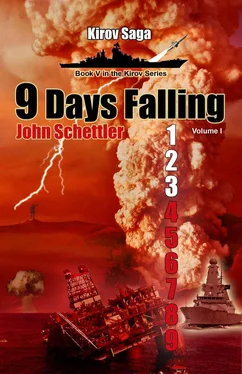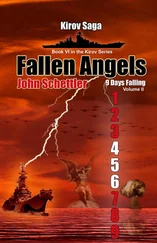The damage from the seven ruptured wells, the “seven sisters of doom,” as they came to be called, was dire enough. The question of saving the Gulf of Mexico was on everyone’s lips in the beginning, but the effects of the disaster on domestic pricing and supply for oil and gas were equally severe. The US had been trying to ‘frack’ its way to energy independence for years, effectively squeezing oil out of rock. Now that limited and very expensive production method could in no way compensate for the massive shortfall, and the President quickly announced the release of the Strategic Petroleum Reserve to mitigate shortages.
What he didn’t announce, however, was the inevitable fact that this problem was going to be far more serious than anyone first believed, and the shortages far more pronounced. Nor did he mention the fact that the 700 million barrels of oil in the reserve would only last 35 days if it had to sustain the average US daily usage of 20 million barrels. If doled out at a more conservative rate of 5 million barrels per day it could ease the shortfall, but producers were immediately looking for any offshore oil they could get to move into the system. Oil on the sea, or ready at coastal terminals was premium now, and any carrier positioned to deliver these commodities to US terminals.
But the US, and the world, did not have 35 days to worry about the problem as the oil dwindled away. They had nine days. Events would soon push even this disaster off the headlines as political posturing and squabbling quickly became all out military confrontation. It would start slowly, building like a bad storm, and Nature would groan in protest, shaking the world with her wrath and displeasure. Nine days…Unless a new version of the events now unfolding could be forged in the past.
On Tuesday, September 21, 2021, Anton Fedorov and two Marines stood in the reactor monitoring room of the Primorskiy Engineering center near Vladivostok. They were the first to go, boldly returning to the last great war in the hopes of preventing the final great war. They soon vanished into the ether to take up the thread of that hunt in a distant past. That same night the Red Banner Pacific Fleet sailed from the Golden Horn Bay under the steady watch of Captain Vladimir Karpov while Admiral Volsky gathered a handful of Marines in his office at Naval Headquarters Fokino. Miles away, a large Antonov-124 cargo plane was finishing up loading operations and preparing for takeoff: eighteen Marines boarded with a team of six nuclear power plant engineers and specialists led by Chief Dobrynin, and one radiation safe container with a very special cargo.
The news crawl on Thunder Horse would dominate the headlines on Wednesday, but come Thursday the worsening situation in the Pacific began to grab news cycles at the top of the hour.
On that morning Karpov was bandying words with his counterpart on an American carrier battlegroup off the coast of Japan, thinking to reach a mutual understanding that would prevent or limit hostilities. The breaking headlines in the news crawl now warned of the imminent potential outbreak of war over Taiwan, and the darkening threats from North Korea. Marshal Kim Jong Un, the so called “Brilliant Commander of Mt. Paektu” declared in a solemn statement to the United Nations: “This sacred war of justice will be a nation-wide, all-people resistance in which the traitors to the nation including heinous confrontation maniacs, warmongers and human scum will be mercilessly swept away.” As it had in the early decades of the previous century, the world was about to lose its grip on sanity in short order.
Dobrynin’s AN-124 Condor circled to land north of Makhachkala on the eastern Caspian coast, and he gazed out the pilot’s window to see the vast expanse of the sea dotted with tiny islands of framed metal on their stubby legs painted international orange—the oil platforms of superfield Kashagan. It was there that a host of producers greedily sunk their umbilicals into the silted bed of the sea to drink from the deep, rich deposits of light sweet crude. On one such platform, appropriately named “Medusa” a man named Ben Flak was having fits with the bad news coming in from the Gulf of Mexico. It was going to be a very busy day for Chevron, Royal Dutch Shell, and British Petroleum. They were all searching to find carriers for any oil they had bunkered in terminals that could be quickly moved to ports in Europe and the US before the situation got any worse.
One such carrier was a small British company, Fairchild Inc., running a fleet of seven tankers and cargo ships with a total lift capacity of 5.5 million barrels, and half of that available for a lucrative haul. The problem the company would face was the cold logic of geopolitics: where oil was found, the fires of war would soon follow.
Miles to the south, in the quiet port of Larnaca, Cyprus, the pipelines of the Caspian Sea were about to become entangled with the lives of a very special person, and a very tough sea captain on a very dangerous ship. It was a circumstance that would bring the Fairchild company into the midst of the gathering storm of war, and link its fate to that of many others who were now hot in the chase to find one man—Gennadi Orlov. But the swirling vortex opening like a black hole in history would expand, pulling people and things into the distant past and a rendezvous with fate itself on the shores of the Caspian Sea.
“I think and deem it for thy best that thou follow me, and I will be thy guide, and will lead thee hence through the eternal place whew thou shalt hear the despairing shrieks, shalt see the ancient spirits woeful who each proclaim the second death. And then thou shalt see those who are contented in the fire…”
~ Dante Alighieri, The Inferno — Canto I
“Here we are, trapped in the amber of the moment. There is no why.”
~ Kurt Vonnegut
Hadhe known what was waiting for them on the journey ahead Fedorov, might have never pushed forward his crazy idea. It was going to be risky, of course. It was going to be a long and dangerous journey, all the way from Vladivostok to the distant shores of the Caspian Sea, with each mile on the cold steel Siberian rails bringing them closer to the thunder and fire of the most savage war ever fought. There was no guarantee that he would ever get there safely; let alone the challenge of finding Orlov, and making it back home. His plan might not work at all! They might never be found by the rescue team. They might find themselves marooned in the past, even as Orlov was when he took that fateful, wild jump from the helicopter.
But they had to try.
The cold fog of Vladivostok harbor was as real as any other, he thought, and it was his only reality now. They were here. They made it through to 1942. They had delivered their letter to the storage bin at the naval supply building and the cold clink of the lock jarred him with the realization of what he had done. It was as if his old life, all of it, was locked away behind that storage bin door and forever lost to him now. The lock would not be opened again for nearly eighty long years. His grandfather had been the last man to close that bin door, perhaps just a few years ago, he thought. Now here he was, sliding that letter into the pocket of his grandfather’s coat, the ghost of a man that had not even been born yet in this year—1942. There it would sit untouched by human hands, unread by human eyes for another eight decades, or so he hoped. Yet the thought that it would be Admiral Volsky reading it one day gave him heart, and hope.
There was no time to lose now, and long dangerous miles lay ahead of them. They moved like ghosts in the mist, wasting no time getting to the rail depot where they found one last train was going to be heading north within the hour and routed all the way to Omsk. That would get them very close to their objective, in Russian terms. No place was really very close to another here, and the lonesome iron rails were often the only means of expeditious travel from one place to another. He made arrangements to get his team aboard this train immediately, and with his black Ushanka hat and NKVD badge he knew they would have no immediate trouble getting aboard. He simply told the Rail Master that he would be inspecting facilities along the entire line, and had vital papers to be delivered in Omsk. No one objected. NKVD officers are not to be trifled with, and a Colonel was a very high rank in that shadowed organization. The Rail Master gave him quick directions, and the engine number of the train. It was a freight haul, but there were two coaches attached at the back of the train just forward of the caboose.
Читать дальше












